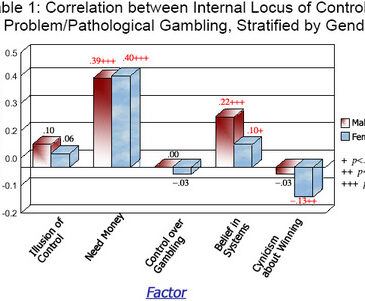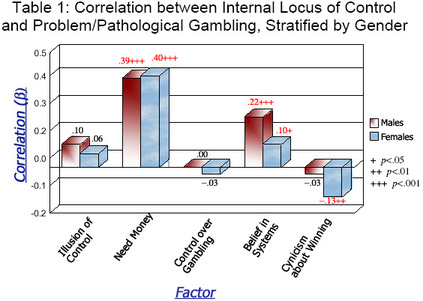The concept of locus of control is a critical component of many cognitive therapies for pathological gambling. In the language of psychology, "locus of control" refers to how an individual understands the factors responsible for a particular behavior, event, or outcome. Individuals who believe they can determine the outcome of an event have an internal locus of control. Conversely, those who believe that outside forces are primarily responsible for the outcome of events have an external locus of control. This concept can be used to distinguish between two distinct types of gamblers. The hypothetical cases below illustrate these types:
- Gambler A plays the lottery every day, believing she has "cracked" the system. She chooses her daily numbers using a system that she herself devised.
- Gambler B believes that the weather affects his chances of winning at the slot machines, so he only plays on sunny days.
Gambler A has an internal locus of control. Gambler B has an external locus of control. To see whether a particular locus of control is associated with problem gambling, Moore and Ohtsuka (1999) assembled a sample of 1,017 persons, ages 14 to 25. Subjects primarily came from working-class areas near Melbourne, Australia.
Table 1: Correlation between Internal Locus of Control and Problem/Pathological Gambling, Stratified by Gender
+ p<.05 ++ p<.01 +++ p<.001
Each subject was given a modified version of the South Oaks Gambling Screen (SOGS). Results indicated that 3.8% of the sample scored in the pathological range, while 10.8% scored in the problem range. Investigators then gave the subjects an instrument designed to measure various factors relating to locus of control. These factors are a) Illusion of control, b) a need for money, c) control over gambling, d) belief in superstitious systems of gambling, and e) cynicism about winning. Respondents with high scores on these scales were considered to have an internal locus of control. Table 1 shows the correlation between having an internal locus of control and being a problem or pathological gambler.
For both males and females, perceived need for money and a belief in systems of "superstitions" are significantly correlated with being a problem or pathological gambler. This provides moderate support for a relationship between an internal locus of control and problem/pathological gambling. As new and better techniques of cognitive therapy are developed, the findings of this study may provide important guidance and support.
References
Moore, S.M. & Ohtsuka, K. (1999). Beliefs about control over gambling among young people, and their relation to problem gambling. Psychology of Addictive Behaviors, 13, 339-347.





